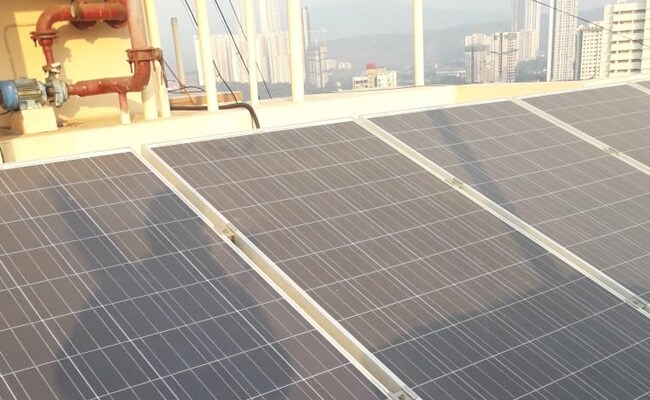- Home/
- This Mumbai Housing Society Fulfills 42 Per Cent Of Its Daily Energy Requirement Through Solar
This Mumbai Housing Society Fulfills 42 Per Cent Of Its Daily Energy Requirement Through Solar

Nestled in Mumbai's Kandivali East, Bhoomi Arkade, a 19-storey high rise building, home to 76 families, has found a way to adopt a lifestyle in sync with the environment. The residents of Bhoomi Arkade took the first step towards sustainable living in 2010 with rainwater harvesting and in April 2016 embrace the power of the sun for their energy needs and ended up saving Rs. 2.8 lakh. The credit of introducing green practices at Bhoomi Arkade goes to Harish Shankar Kate, the secretary of the society.
Talking to NDTV, recalling the idea behind switching to solar energy for building's daily energy needs, Mr Kate said,
I have always been inclined towards making greener choices and this is the reason in the last 11 years, as society's secretary, I have introduced various eco-friendly practices. The idea behind harnessing solar energy was to reduce our dependency on conventional sources of energy and utilise what is already at our disposal. Solar energy is omnipresent and infinite source of energy so why not use it and save both the environment and money rather than depending on regular grid supply for which tariff increases every six months.
Bhoomi Arkade's transition to solar energy began with installing 40 solar panels, each having a capacity of 300 watts. Together the 12 kW rooftop solar power plant produces 56 to 58 units of energy every day, as opposed to the daily requirement of 130-138 units. The energy produced by solar panels is utilised in society's daily operations - running lift, common lights, fan, and water pump.
During peak summer, solar panels produce energy way more than our requirement. The extra units are exported to the grid/local power distribution company and are credited to our monthly bill. For instance, in a month we utilised 4,000 units and exported 300 units then the local DISCOM will charge us for 3,700 units. We have got a net meter installed to keep a check on the number of units exported.
To further reduce the power consumption, society switched to energy efficient appliances like LED bulbs and tubelights which emit more light while consuming less energy; sensor based lighting and fan were installed in the corridors of the apartment blocks and in the lift.
Switching to solar and energy efficient appliances has reduced society's daily power consumption.
In year 2012-2013, our (society's) daily requirement was 180 units. Since 2016, the daily requirement has come down to 130-138 units. Approximately, 42 per cent of our daily requirement is met by solar, said Mr Kate.
Switching to solar did require a huge investment but Mr Kate believes that they have almost recovered the money. Elaborating on the investment made, Mr Kate said,
Initially, we had decided to have 10 kW capacity solar panels costing Rs. 8 lakh – money taken out from the monthly maintenance fund. But when one of the residents donated Rs. 1.5 lakh for the project, we increased the capacity to 12 kW. We did invest almost Rs. 10 lakh, but with solar and smart choices, our monthly energy bill has come down. For the year 2011-12, our energy bill was Rs. 7,24,502 and in 2017-18, it came down to Rs. 5,15,926. By April 2021, we will recover Rs. 9.5 lakh.
Inspired by the successful implementation of solar power plants at Bhoomi Arkade and its benefits, three neighbouring societies and three schools decided to go solar. Talking to NDTV about switching to solar energy and earning from it, Monica Bhat, Trustee of Children's Academy Group of Schools, said,
Bhoomi Arkade society was our motivation to implement solar in all three of our schools in Mumbai. The installation process was done in a phased wise manner. If we take the example of one school, like our branch in Thakur Complex, 35 kW capacity of solar panels produce 140-180 units every day. On an average, our monthly energy bill has come down by Rs. 30,000 to Rs. 40,000.
Children's Academy School was able to bring down their energy bill by around Rs. 40,000 because out of 365 days, school is shut on 130 days. The energy generated during off days is fed to the local grid and credited to the bill.
When we got solar plants installed for the first time in 2017, we had to invest Rs. 21 lakh for a solar plant having a capacity of 35 kW but by the time we came to the third school, we got a 50 kW plant at the same cost. Solar has become financially viable now and I believe if marketed well and if the general public is given a fair idea of the benefits of solar energy, it has a good future and going forward, more and more people will install solar, said Ms Bhat.
also read
Solar Is The Best Economic Investment, Says Ecologist Who Has Paid Zero Power Bill For Last Three Years
Written by Aastha Ahuja, Edited by Sonia BhaskarMonthly Power Bill Of Just Rs 130, Here's How A Couple In Kochi Did It
Written by Aastha Ahuja, Edited by Sonia BhaskarHimachal Pradesh's The Kalgidhar Society Saves Rs. 3.4 Crore Per Annum By Harnessing The Power Of Solar
Written by Aastha Ahuja, Edited by Sonia Bhaskar
About The Campaign

NDTV in partnership with Luminous has launched an awareness campaign ‘Be A Bijli Donor’ to promote the idea of ‘save power for more power’. The idea is to conserve energy today in order to get more power tomorrow.
We inherently know that saving energy results in low energy bills, but we also need to understand that a unit of energy saved today makes it available for people still living in the dark or facing regular power cuts.
Saving power or conserving energy is about knowing the sources of energy, and areas of wastage and thereby eliminating these through technology and lifestyle changes. For instance, a 100 W (Watt) incandescent (ICL) bulb can be replaced with a 9 W LED bulb offering similar performance in terms of light output, but at far lower consumption of energy.
While a 100 W ICL bulb, used for four hours a day, consumes 146 units of energy per year, a 9 W LED bulb requires only 13.5 units per year. Clearly, switching to LED is a smart choice as it provides the same output while consuming 90 per cent less energy.
The focus of the campaign is to instill the idea of ‘save power for more power’ and in order to do so, the initiative will create awareness about energy efficient products and services, smart ways to reduce power consumption, alternate sources of energy like solar energy and the need to conserve energy. The idea is to address the rising need for energy conservation in India.
As part of the campaign, we will highlight the stories of individuals and organisations who are championing the cause of energy conservation by switching to renewable sources of energy, adopting innovations to reduce energy consumption while enjoying the same output.
The initiative will provide a platform for all stakeholders to share their ideas and work towards the common goal of, ‘Save power for more power’.






